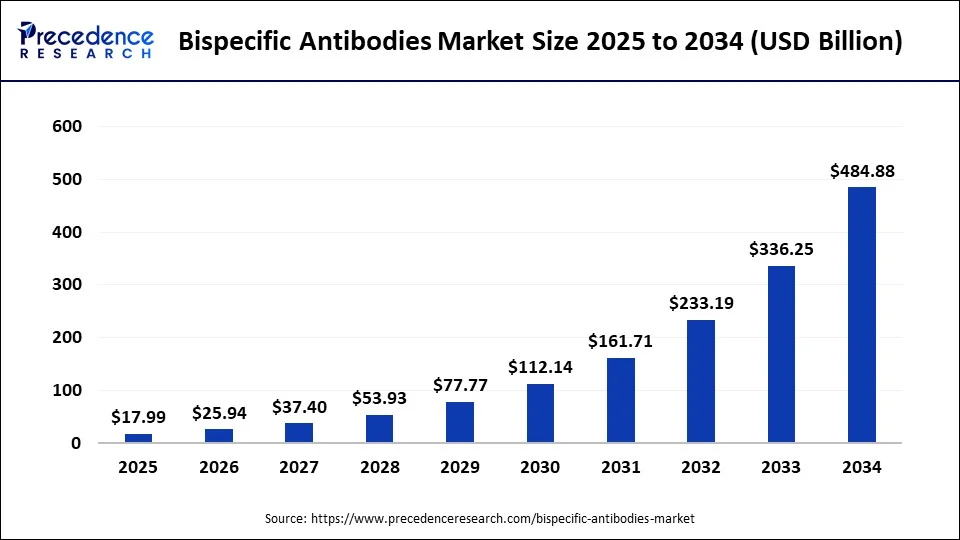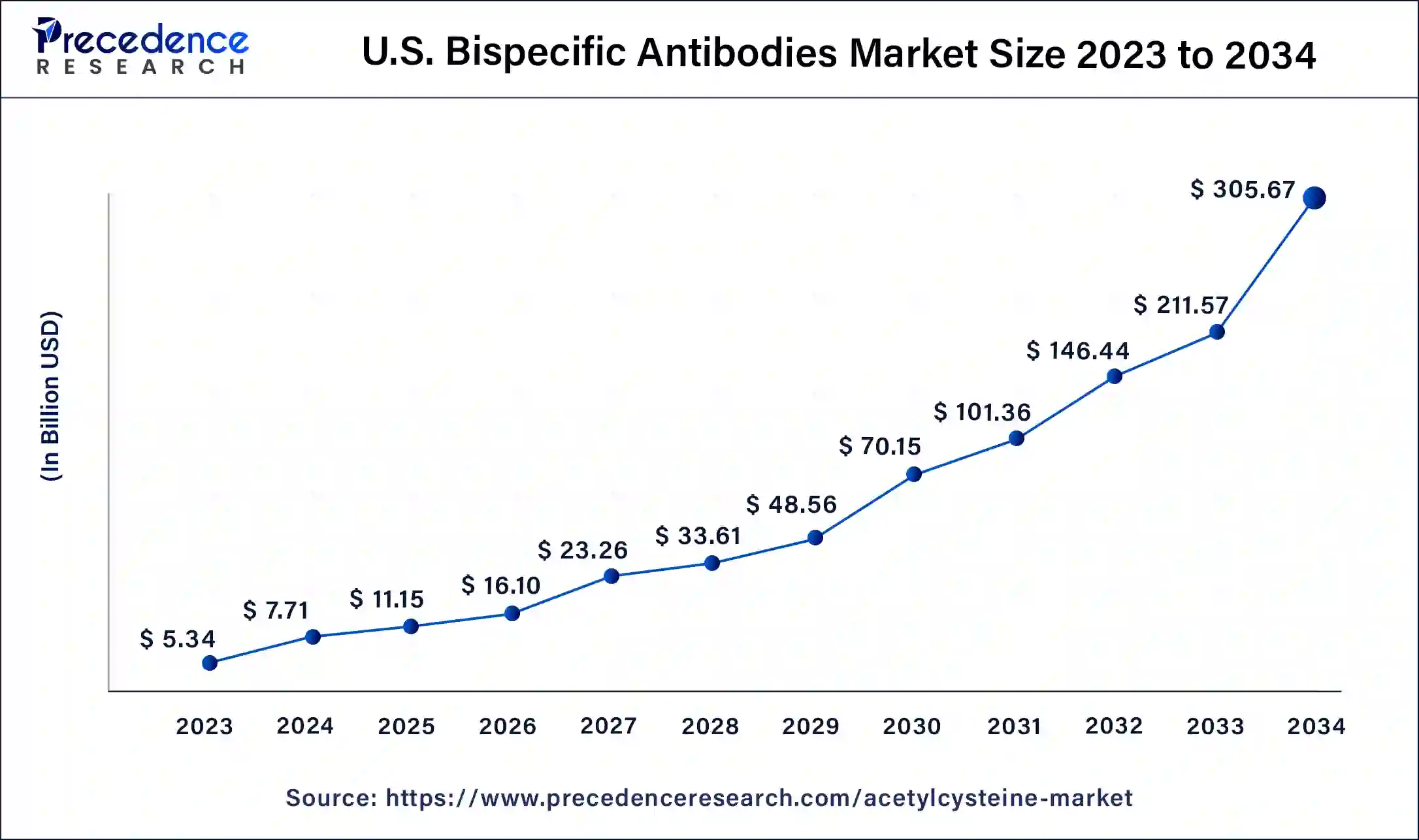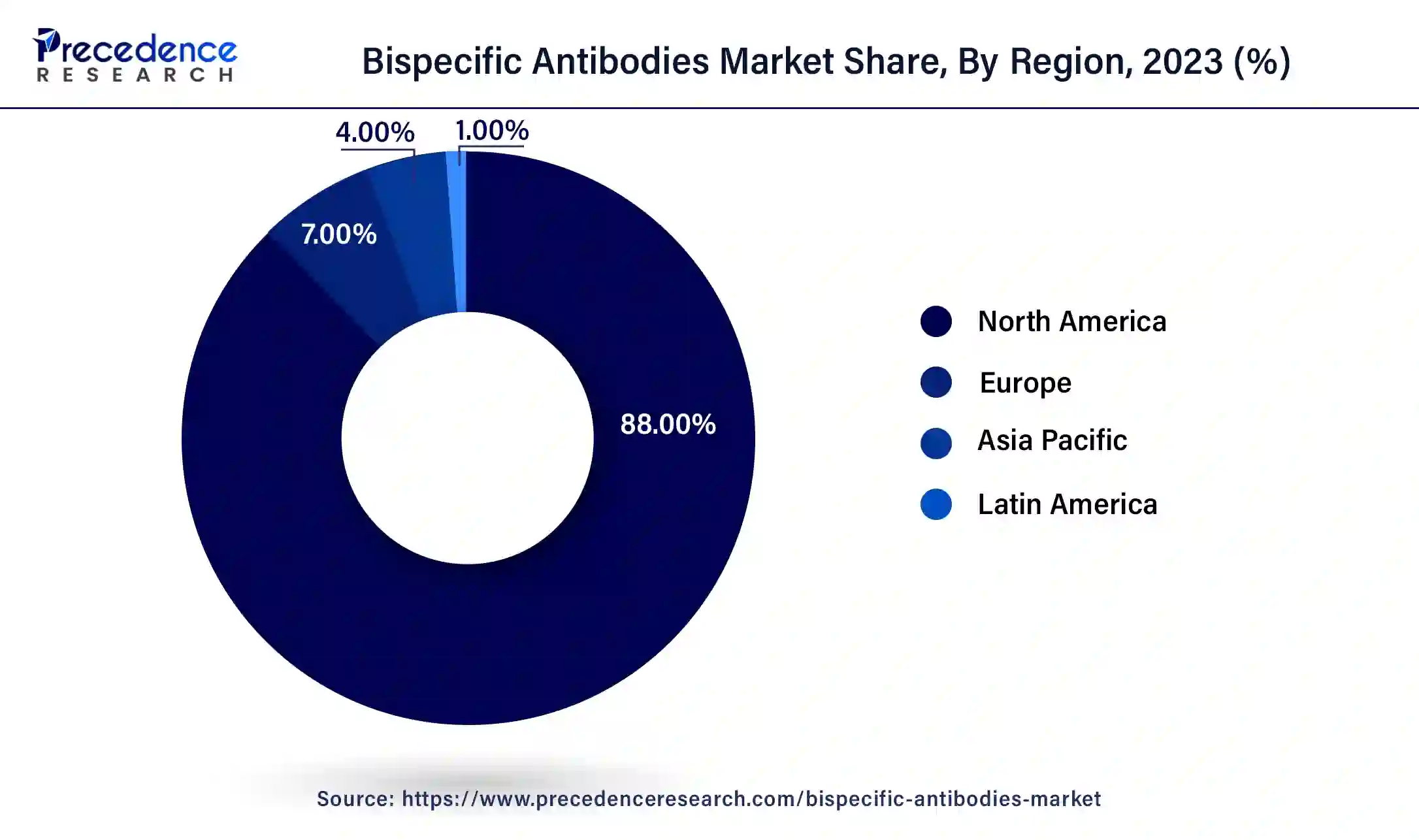June 2024
Bispecific Antibodies Market (By Indication: Cancer, Inflammatory & Autoimmune Disorder, Others; By Distribution Channel: Hospital Pharmacies, Retail Pharmacies, Drugstores, Online Pharmacies) - Global Industry Analysis, Size, Share, Growth, Trends, Regional Outlook, and Forecast 2024-2034
The global bispecific antibodies market size was USD 8.65 billion in 2023, calculated at USD 12.47 billion in 2024, and is expected to reach around USD 484.88 billion by 2034. The market is expanding at a solid CAGR of 44.2% over the forecast period 2024 to 2034. The North America bispecific antibodies market size reached USD 7.61 billion in 2023.

The U.S. bispecific antibodies market size was estimated at USD 5.34 billion in 2023 and is predicted to be worth around USD 305.67 billion by 2034, at a CAGR of 44.5% from 2024 to 2034.

North America emerged as the dominating region in the bispecific antibodies market, capturing the largest market share of 88%. North America, particularly the United States, has been at the forefront of bispecific antibody research, development, and commercialization globally. The region boasts a robust biotechnology and pharmaceutical industry, along with a conducive regulatory environment and significant investment in research and development. Major biotech hubs like Boston, San Francisco, and San Diego have fostered innovation and collaboration in this field. The presence of leading pharmaceutical companies and academic institutions conducting cutting-edge research has further propelled North America, particularly the United States, as a market leader for bispecific antibodies worldwide.

Europe region is estimated to expand the fastest CAGR of 46.5% between 2024 and 2034. Germany, the United Kingdom, and Switzerland have been pivotal in driving the significant growth of the bispecific antibodies industry in Europe. These countries host prominent pharmaceutical companies, academic institutions, and research centers that have actively contributed to the development and marketing of bispecific antibodies. Regulatory bodies such as the European Medicines Agency have played crucial roles in providing guidelines and approvals for the use of bispecific antibodies in medical treatments. The collaborative efforts between these nations, supported by robust regulatory frameworks and innovative research initiatives, have propelled Europe as a key player in the global bispecific antibodies market.
The bispecific antibodies market offers a groundbreaking class of artificial proteins engineered to address complex diseases and therapeutic challenges. These antibodies are designed to possess dual specificity, enabling them to simultaneously bind to two distinct targets, such as antigens or receptors, within the biological system. The construction of bispecific antibodies involves the fusion of two or more antigen-binding elements derived from separate parental antibodies. This fusion creates a single construct with the ability to engage multiple targets simultaneously. The design flexibility allows for various formats, including full-length immunoglobulins, antibody fragments, or other engineered protein scaffolds.
The unique ability of bispecific antibodies to bridge multiple cellular or molecular targets offers several therapeutic advantages. In cancer therapy, for instance, bispecific antibodies can target both tumor cells and immune cells, thereby enhancing the immune response against cancer cells while minimizing off-target effects. Similarly, in autoimmune diseases, bispecific antibodies can be engineered to bind to both disease-causing cells and regulatory cells, modulating immune responses and restoring immune balance. The versatility and specificity of bispecific antibodies have spurred considerable interest and innovation in drug development. They hold the potential for treating a wide range of diseases, including cancer, autoimmune disorders, infectious diseases, and inflammatory conditions. As research and development efforts continue, bispecific antibodies are poised to play a significant role in shaping the future of precision medicine and personalized therapeutics.
Bispecific Antibodies Market Data and Statistics
| Report Coverage | Details |
| Growth Rate from 2024 to 2034 | CAGR of 44.2% |
| Global Market Size in 2023 | USD 8.65 Billion |
| Global Market Size in 2024 | USD 12.47 Billion |
| Global Market Size by 2034 | USD 484.88 Billion |
| U.S. Market Size in 2023 | USD 5.34 Billion |
| U.S. Market Size by 2034 | USD 305.67 Billion |
| Base Year | 2023 |
| Forecast Period | 2024 to 2034 |
| Segments Covered | By Indication and By Distribution Channel |
| Regions Covered | North America, Europe, Asia-Pacific, Latin America, and Middle East & Africa |
Antibody engineering and the rising prevalence of cancer and autoimmune diseases
Antibody engineering stands at the forefront of the bispecific antibodies market, driving innovation and therapeutic advancements. Recent years have witnessed remarkable progress in developing novel antibody formats and engineering techniques, revolutionizing the generation of bispecific antibodies. These advancements leverage recombinant DNA technology and protein engineering to construct bispecific antibodies with superior pharmacokinetics, reduced immunogenicity, and enhanced tumor penetration.
The rising prevalence of cancer and autoimmune diseases has fueled the demand for novel therapeutic modalities, highlighting the importance of bispecific antibodies in addressing unmet medical needs. Cancer and autoimmune diseases pose significant challenges to patients and healthcare systems worldwide, underscoring the urgency for effective treatments. Bispecific antibodies offer a promising approach by simultaneously targeting two different antigens, thereby augmenting therapeutic efficacy.
One notable example of a successful bispecific antibody is blinatumomab, which targets CD19 and CD3 antigens. This innovative therapy has demonstrated remarkable success in the treatment of B-cell acute lymphoblastic leukemia (ALL) and is under evaluation for other hematologic malignancies. Blinatumomab's ability to engage both CD19-expressing B cells and CD3-expressing T cells facilitates targeted cell killing, offering a potent and selective treatment option for patients with refractory or relapsed ALL.
The versatility of bispecific antibodies extends beyond oncology, encompassing a wide range of autoimmune diseases and other therapeutic areas. These antibodies hold promise for treating conditions such as rheumatoid arthritis, multiple sclerosis, and inflammatory bowel disease, where aberrant immune responses play a central role in disease pathogenesis. Hence, the convergence of antibody engineering advancements and the pressing need for innovative therapeutics has propelled the bispecific antibody market forward. As research continues to unravel the complexities of disease biology, bispecific antibodies stand poised to revolutionize treatment paradigms, offering hope to patients and healthcare providers alike in the fight against cancer, autoimmune diseases, and beyond.
Complexity of the manufacturing process
The development and manufacturing of bispecific antibodies present significant challenges and limitations that can impede market growth and innovation. One key challenge is the complexity of the manufacturing process, which often requires specialized techniques and expertise. Synthesizing bispecific antibodies involves intricate molecular engineering and purification methods, leading to increased production costs and scalability limitations. The unpredictability of success further exacerbates this challenge, as failure to demonstrate efficacy or safety in clinical trials can result in significant financial losses. Regulatory hurdles also pose challenges to market entry and product approval. Bispecific antibodies are subject to stringent regulatory requirements, necessitating comprehensive preclinical and clinical data to demonstrate safety and efficacy. Achieving regulatory approval can be time-consuming and resource-intensive, further adding to the cost and complexity of bringing bispecific antibodies market.
Furthermore, competition from alternative immunotherapies, such as monoclonal antibodies and cell therapies, adds pressure to the bispecific antibody market. These alternative treatments offer alternative approaches to target diseases, intensifying competition and driving the need for differentiation and innovation. Inconsistencies in product quality and production consistency can also arise due to the complexity of the manufacturing process, posing additional challenges for manufacturers and regulators alike. Therefore, while bispecific antibodies hold immense therapeutic potential, overcoming these challenges and limitations is essential to realizing their full clinical and commercial impact.
Advancements in immunological research and biotechnology breakthroughs
The global bispecific antibodies market is poised for significant growth, fueled by advancements in immunological research and biotechnology breakthroughs. One of the primary drivers of this growth is the expanding application of bispecific antibodies in oncology. These innovative therapeutics offer tailored and targeted treatment options for various malignancies, holding the potential to improve patient outcomes significantly. Moreover, the versatility of bispecific antibodies extends beyond oncology into non-oncology therapeutic fields such as autoimmune diseases, infectious diseases, and neurodegenerative disorders. Their ability to simultaneously target multiple disease pathways makes them promising candidates for treating a wide range of conditions.
Furthermore, the growing popularity of combination therapies, wherein bispecific antibodies are used alongside other immunotherapies or conventional treatments, presents synergistic opportunities to enhance treatment efficacy. By leveraging the complementary mechanisms of action of different therapeutic modalities, combination therapies have the potential to improve patient responses and outcomes. Additionally, the capacity of bispecific antibodies to modulate the immune system aligns with the increasing demand for immunotherapies across various disease areas. As the understanding of immune system function and dysregulation continues to evolve, bispecific antibodies stand at the forefront of therapeutic innovation, offering novel strategies for addressing unmet medical needs and improving patient care globally.
The cancer segment held the highest market share of 68% in 2023. Cancer represents a significant global health challenge, prompting the quest for innovative therapies such as bispecific antibodies. These antibodies possess the unique ability to target multiple tumor-associated antigens simultaneously, thereby augmenting therapeutic effectiveness. Despite the availability of various cancer treatments, certain cancer types still present limited therapeutic options. Bispecific antibodies offer a promising solution by simultaneously targeting multiple pathways or antigens implicated in cancer progression. Their specificity for cancer cells or tumor-associated antigens while sparing healthy cells reduces off-target effects and minimizes toxicity, distinguishing them from conventional therapies. This feature renders bispecific antibodies an appealing option for cancer treatment, potentially enhancing patient outcomes.
The inflammatory and autoimmune disorders segment is anticipated to witness rapid growth at a significant CAGR of 36.8% during the projected period in the bispecific antibodies market. Inflammatory and autoimmune disorders pose significant challenges due to their complex and multifaceted nature, impacting patients' quality of life and causing chronic inflammation and tissue damage. Existing therapies often target single molecular pathways, leaving unmet medical needs for patients who exhibit inadequate responses or intolerance. Bispecific antibodies like tibulizumab and Ozoralizumab offer a promising solution by engaging multiple targets simultaneously. This comprehensive approach allows for the modulation of diverse disease mechanisms, including dysregulated immune responses and abnormal signaling pathways. By targeting two relevant molecules simultaneously, bispecific antibodies offer enhanced flexibility and specificity, addressing the intricate nature of inflammatory and autoimmune disorders and potentially improving patient outcomes.
The hospital pharmacies segment has held a 43.5% market share in 2023. The dominance of hospital pharmacies in the market is expected due to the substantial demand for these items in healthcare settings. Retail pharmacies are projected to expand significantly owing to the increasing availability of these medicines across various channels. Moreover, online pharmacies have gained popularity due to the convenience they offer to patients, contributing to their growth in recent years.
The retail pharmacies segment is anticipated to witness significant growth of 37.5% over the projected period. The increasing prevalence of chronic diseases and the rising demand for targeted therapies have led to greater accessibility and availability of Bispecific antibodies in retail pharmacies. Additionally, advancements in healthcare infrastructure and the expansion of retail pharmacy networks have facilitated easier access to these specialized medications for patients. Also, growing consumer preference for convenient healthcare services and the ability to receive prescription medications closer to home have contributed to the expansion of the retail pharmacies segment in the Bispecific antibodies market.
Segments Covered in the Report
By Indication
By Distribution Channel
By Geography
For inquiries regarding discounts, bulk purchases, or customization requests, please contact us at sales@precedenceresearch.com
No cookie-cutter, only authentic analysis – take the 1st step to become a Precedence Research client
June 2024
November 2024
October 2024
October 2024